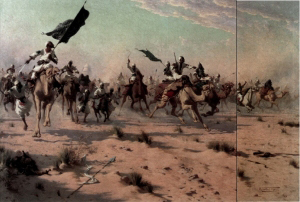 |
Peoples' movements and protests |
 |
|
MobilizationsSpanish comunerosDacke and French camisardsDutch CalvinistsEnglish PuritansThe Russian tradition of rebellionAndean peasantsThe jihad traditionBack to Tax revoltsBack to Old movementsBack to main page |
The jihad tradition
In the self-sufficient economy of traditional society, it is difficult for farmers to organize themselves over larger areas. Often it is religious movements that are given that role – as long as they have a sufficiently universalist appeal. So also in North Africa and West Asia, not least when the European power establishments carved out spheres of interest for themselves in order to subjugate raw materials and force people to work for the Europeans for free. The traditional supraregional movement here was the Sufi fraternity – religious movements that in addition to their faith in God also devoted themselves to schools, healthcare and hotel activities and other non-profit activities. They were considered to be the ones who could best defend society when foreign invaders entered and by virtue of superior financial resources bribed state authorities for concessions. The traditional form of
rising was called jihad (which roughly means ”fight
for a just society”) – it differed little from a traditional
peasant uprising except that it had a strong political-religious
program and was under the control of a Sufi movement. That movement was kicked off by the fact that imports of cheap European goods ruined the domestic craftsmen and that a more efficient collection apparatus forced people to pay taxes. A religious movement, the Mahdiya, demanded a return to the traditional state before the Europeans and soon gained political and military control wherever the occupying forces did not concentrate hard. This went on for a while, but in order to defeat the Europeans, the movement also had to raise taxes effectively and act as a modern state, which caused more and more people to fall away. When the British army finally slaughtered the Mahdist army, the movement had ceased to have any major significance. Reading
|
